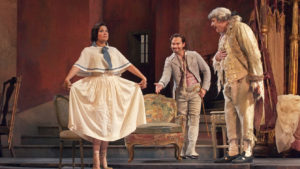
Opera Profile: Donizetti’s Greatest Comedy ‘Don Pasquale’
By David SalazarDonizetti wrote his fair share of comedies throughout his career. While “L’Elisir d’Amore” remains his most popular by far, there is something to be said about “Don Pasquale” being the finer of the two musically and dramatically.
Premiering on Jan. 3, 1843 in Paris, the opera marks the end of the 19th century opera buffa tradition. The next major Italian comedy would be Verdi’s “Falstaff” and it would break with that tradition outright, opting for a far different musical aesthetic that alluded to the traditions of opera buffa but also subverting them.
Short Plot Summary
Ernesto wants to marry his beloved Norina, but his uncle Don Pasquale wants him to take a more noble wife so that he doesn’t have to take care of his nephew any longer. But Ernesto refuses, so Pasquale decides that he will take a wife to produce his own heir and have no obligations to his nephew. So Dr. Malatesta offers to introduce him to his sister.
Norina and Malatesta consult the plan so that she can appear to be his sister, marry Pasquale and then make his life hell to win back Ernesto. They arrive at Pasquale’s house and it all works according to plan. Disguised as Sofronia, she manages to convince Pasquale that she is a tame woman. They elope (with a false notary) and then she suddenly reveals herself as fierce and difficult, making the unsuspecting Pasquale go bezerk from the mayhem his new wife creates.
Pasquale confronts his “wife” about her carefree spending but she dismisses him outright, seeking advice from Malatesta. Pasquale believes she has a secret affair. The two plan to discover her in the act. Ernesto brings Norina a serenade, the two meet in the garden and are subsequently “discovered.” Pasquale confronts his wife and she reveals herself to be Norina. Pasquale, thrilled that he is not married, allows the two young lovers to elope.
Famous Musical Passages
“Pasquale” is rife with well-known musical numbers from Norina’s opening aria, to the duet between Malatesta and Norina, to Ernesto’s “Cercherò lontana terra,” his famed serenade and the love duet “Tornami.” But the most famous moment in the opera is the so-called “Patter duet” in which Malatesta and Pasquale plan to uncover Sofronia’s infidelity. The two men are asked to sing fiercely rhythmic passages at top speed. It usually leads to encores in most performances.
Watch and Listen
Here is a performance from La Scala starring Ferruccio Furlanetto, Gregory Kunde, and Nuccia Focile, under the baton of Riccardo Muti.
Categories
Opera Wiki

